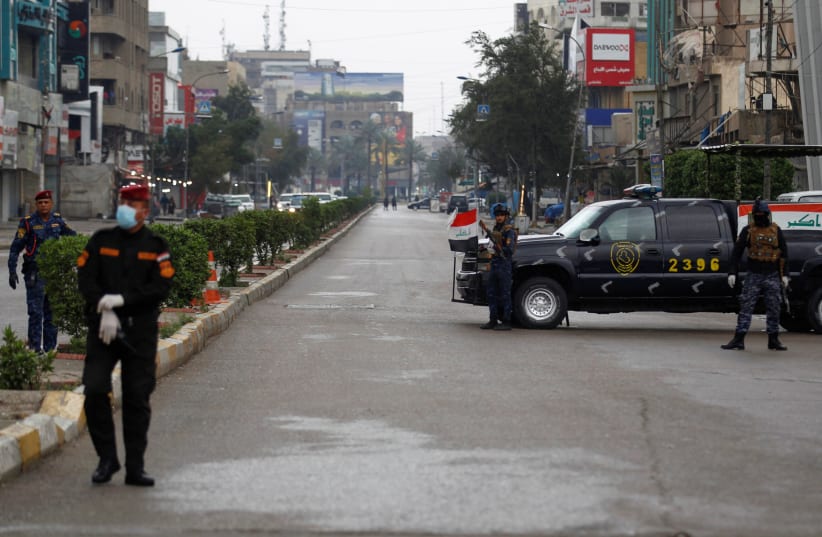The battle against the coronavirus is as important as the struggle against Israel, an online post by the Palestinian Mujahideen Brigades said Wednesday. They are one of many groups in the Middle East who claim to have swapped their AK-47s for disinfectant during the global pandemic.
The first cases of coronavirus in the Gaza Strip this week have worried Hamas leaders. They are concerned it could spread to the congested cities they govern and overwhelm their already weakened health sector in the blockaded strip.
A Mujahideen Brigades banner reflects the groups' position of equivicating fighting for the sake of jihad and combating the spread of #COVID19. #Gaza pic.twitter.com/b5Dqu0EQCH
— Joe Truzman (@Jtruzmah) March 25, 2020
Hamas has put out videos of its fighters holding hoses rather than rockets and spraying what they claim is disinfectant on party offices and streets.
The Mujahideen Brigades are a small Gaza-based group that has put out several videos in recent months, according to research by Joe Truzman at the Foundation for Defense of Democracy’s Long War Journal. Now they are working with Hamas to stop the virus.
Palestinian Islamic Jihad, which is supported by Iran, is also joining the battle against the pandemic.
“We are prepared for everything,” it posted, with an image copied from Iran that shows a man who is half soldier, half doctor. Like the Islamic Revolutionary Guard Corps in Iran, which has taken a lead in fighting a “biological war” against the virus, Islamic Jihad also want to show it can put up scrubs.
Claiming that we are "at war" with #COVID2019 is not a prerogative of Western politicians. The Islamic Jihad Movement in #Gaza, an organization designated as terrorists inter alia by the US and the EU, puts it this way: "We are prepared in every arena." #coronavirus #Jihad pic.twitter.com/BkOWzssAoY
— Simon Wolfgang Fuchs (@Simon_W_Fuchs) March 25, 2020
Hezbollah in Lebanon is also sending aid to the front line. It hopes to resist the virus in Lebanon through more than $1 million in donations and is sending ambulances, 1,500 doctors and more than 3,000 nurses and medical personnel to volunteer and help against the pandemic.
Hezbollah is helped by its influence over the Health Ministry in Lebanon and uses the resources of a state within a state. Proficient in stockpiling weapons in warehouses, precision guidance and tunneling, the group says it hopes to use its expertise for a “huge plan” to fight the virus, according to Al-Manar, a Lebanese satellite television station.
In Iraq, the pro-Iranian proxy group Asaib Ahl al-Haq is also involved in a campaign to disinfect Baghdad. Previously accused of suppressing protests, it has turned to suppressing the virus.
Kataib Hezbollah, another group in Iraq that is linked to Iran, is not as focused. It says it is too busy monitoring US troop movements. However, on March 24 an officer linked to the group said it would assist at five hospitals in Iraq.
Harakat Hezbollah al-Nujaba, Hashd al-Shaabi and the Popular Mobilization Units of which it is part, are also conducting an awareness campaign in Ramadi about the virus.
Other terrorist groups in the region have also warned about the virus. ISIS advises its members not to go to Europe. Hayat Tahrir al-Sham in Idlib province in northern Syria, a group linked to al-Qaeda in the past, has reportedly detained a preacher to prevent gatherings that could spread the virus.
Other groups, including the Taliban, apparently are prepared to listen to advice from healthcare workers and have expressed concern about prisoners. Hamas is also worried about its prisoners.
Meanwhile, the Iranian-backed Houthis in Yemen sought to close Sanaa’s airport to UN travelers due to high rates of infection in Europe.
Not all militant and terrorist groups care about the pandemic. In parts of the Sahel, terrorist groups linked to Boko Haram and others have carried out increased attacks. This swath of ungoverned territory stretching from the borders of Chad to Niger and beyond is a concern because the virus and extremist groups easily exploit it.
Nevertheless, armed groups across the Middle East, many of them unable to test for the virus and lacking medical support, are picking up the disinfectant alongside the rifle, preparing for what they know is a looming threat.
This has the effect of shifting their attention from fighting their various enemies, such as Iranian proxies aiming rockets at US forces in Iraq or Hamas targeting Israel. Hamas wants aid from Turkey or Qatar as it worries about the pandemic.
